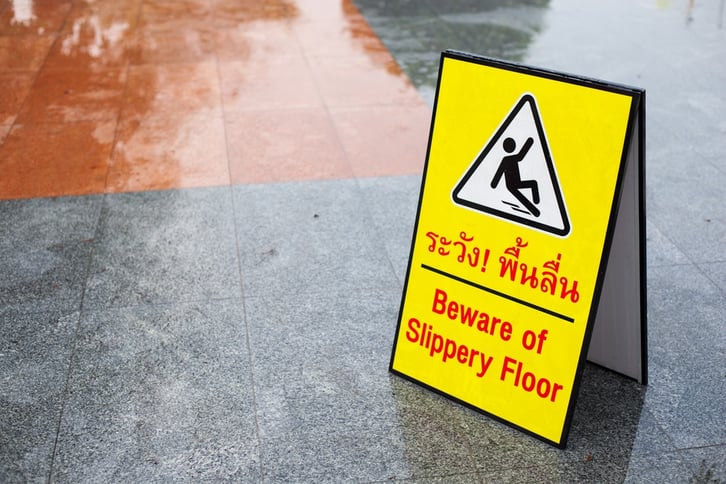
When winter storms hit, ordinary daily activities can be a real struggle. Snow and ice can build up on sidewalks, parking lots, and entranceways to businesses, causing wet, slick conditions inside buildings. Do you know what your rights are if you suffer a slip-and-fall injury or other weather-related occurrence on commercial property?
Responsibilities of Property Owners & Tenants
In New Jersey, both commercial property owners and businesses that rent space at those properties have a responsibility to keep the premises safe for everyone who has a right to be there. If owners or tenants know or should know of a hazard on the property, they can be held responsible for any injuries visitors sustain as a result of the hazard. Their responsibility extends to any surrounding areas of the building that visitors can be expected to use while they are engaging in business, such as adjacent sidewalks, walkways, and parking lots.
Because of this, commercial property and business owners also have a legal duty to make reasonable, frequent inspections of these areas in order to discover any dangerous conditions that might develop. If they are unable to fix a hazardous condition, they must warn the public of the danger and make efforts to prevent anyone from suffering an injury because of it. This is called their “duty of care.” Failure to fulfill this duty may be grounds for a finding of negligence and financial responsibility in a premises liability lawsuit.
What kind of things are hazards?
Some hazards are obvious, like foot-high snowbanks, frozen ponds, or ice-covered walkways. Other hazards can be subtle, like black ice, broken or uneven pavement, or unstable walkways. In the winter, hazards can be temporary conditions due to quickly changing weather, so it’s even more important that owners and tenants inspect their premises regularly to check for potential dangers. Improperly maintaining parking lots can lead to liability for auto accidents and collisions. Poor maintenance on outside walkways as well as inside entryways can lead to liability for slip-and-fall injuries. Some winter conditions, like the obvious hazards listed above, cannot be completely eliminated or prevented; if an owner or tenant cannot do so, it has a duty to take reasonable care to mitigate the risk of injury to visitors and adequately warn them of the danger.
Who is responsible for your injuries?
Just because an injury occurs on commercial property doesn’t automatically mean that the property owner is legally responsible. In order to recover for your injuries, you have to prove that
- The business or landlord breached its legal duty of care, and
- You suffered injuries as a result of that breach of duty.
In order to prove the first point, you must show evidence of negligence: that the business or owner did not take “reasonable” precautions to keep the premises safe, eliminate hazards, or warn of a hazard that could not be eliminated.
For example, if you fall on a business’ front walkway after slipping on a buildup of ice that appeared to be caused by water dripping from a broken gutter, you may be able to recover if you prove that the business or property owner
- Didn’t take steps that a reasonably prudent business owner would have taken during wintery weather, like putting down salt or de-icing chemicals and regularly inspecting the property for slippery conditions; or
- Actually knew of the broken gutter and the ice buildup and didn’t take steps to fix the cause of the problem or appropriately warn of the hazard (for example, by cordoning off that area of the entranceway and placing a sign warning of icy conditions).
What is “reasonable” depends on the facts of each case, but it can include evaluating whether the business and/or property owner has procedures in place to prevent the conditions and has authorized agents tasked with inspecting and fixing hazardous conditions. In most cases, a court will consider witness testimony about the facts of the occurrence as well as expert testimony about the proper standard of care and whether the landlord or owner’s actions fulfilled that duty.
What can I recover for slip-and-fall or premises liability claims?
You may be entitled to compensation for many kinds of harm, called “damages.” These can include pain and suffering, compensation for medical expenses, devices, and care, lost wages and/or loss of earning capacity, and loss of the ability to enjoy life’s pleasures in the same way as prior to the injury.
A skilled personal injury lawyer who is experienced in slip-and-fall and premises liability cases can help you protect your rights and recover damages. Click below to download our FREE guide discussing how you can protect your rights if you are injured on commercial property. Then contact us to make an appointment with one of our experienced personal injury attorneys in Oradell, Basking Ridge, or Newark.



.svg)